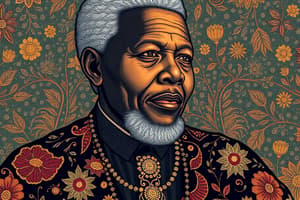Podcast
Questions and Answers
What is the relationship between trust and communication?
What is the relationship between trust and communication?
- Trust has no effect on communication.
- Communication is always challenging, regardless of trust.
- High trust makes communication effortless. (correct)
- Clear communication eliminates the need for trust.
How does low trust affect relationships according to the content?
How does low trust affect relationships according to the content?
- It leads to searching for hidden meanings. (correct)
- It creates a sense of security.
- It fosters collaborative efforts.
- It promotes open communication.
What analogy is used to describe trust in relationships?
What analogy is used to describe trust in relationships?
- Trust resembles a contractual agreement.
- Trust is like a minefield.
- Trust is akin to a hidden tax.
- Trust is the glue of life. (correct)
What effect does high trust have on mistakes made during communication?
What effect does high trust have on mistakes made during communication?
What key characteristic is emphasized as vital for building strong relationships?
What key characteristic is emphasized as vital for building strong relationships?
What was the primary realization the speaker had about his relationship with his wife after completing the project?
What was the primary realization the speaker had about his relationship with his wife after completing the project?
How did the speaker's wife feel during the final months of the project?
How did the speaker's wife feel during the final months of the project?
What did the speaker find surprising about his wife's feelings during the project?
What did the speaker find surprising about his wife's feelings during the project?
What element contributed greatly to the speaker's realization about the importance of nurturing a relationship?
What element contributed greatly to the speaker's realization about the importance of nurturing a relationship?
What metaphor did the speaker use to illustrate the concept of trust in relationships?
What metaphor did the speaker use to illustrate the concept of trust in relationships?
What is the main purpose of making emotional deposits in relationships?
What is the main purpose of making emotional deposits in relationships?
Which characteristic is highlighted as necessary for making deposits in relationships?
Which characteristic is highlighted as necessary for making deposits in relationships?
What is indicated as a common element among emotional deposits?
What is indicated as a common element among emotional deposits?
How does understanding another person's perspective influence emotional deposits?
How does understanding another person's perspective influence emotional deposits?
What does the term 'sacrifice' refer to in the context of making emotional deposits?
What does the term 'sacrifice' refer to in the context of making emotional deposits?
What is emphasized as a critical element in fostering trust between individuals?
What is emphasized as a critical element in fostering trust between individuals?
What was the primary reaction of the high-level executive after the presentation?
What was the primary reaction of the high-level executive after the presentation?
According to the insights shared, what often complicates the act of keeping promises?
According to the insights shared, what often complicates the act of keeping promises?
Which statement best captures the concept of 'integrity therapy' as discussed in the content?
Which statement best captures the concept of 'integrity therapy' as discussed in the content?
What was a significant outcome of the author's face-to-face communication experience with the executive?
What was a significant outcome of the author's face-to-face communication experience with the executive?
What motivated the individual to explore integrity therapy?
What motivated the individual to explore integrity therapy?
What effect does making and breaking promises have on trust?
What effect does making and breaking promises have on trust?
What did the individual attribute his inner peace to after making significant personal changes?
What did the individual attribute his inner peace to after making significant personal changes?
What does the author suggest is a common pitfall of swift promise-making?
What does the author suggest is a common pitfall of swift promise-making?
What was the central theme of the individual's therapeutic approach?
What was the central theme of the individual's therapeutic approach?
What was the individual's reaction upon realizing he didn’t know his student’s name?
What was the individual's reaction upon realizing he didn’t know his student’s name?
What does win-lose thinking typically stem from?
What does win-lose thinking typically stem from?
Which of the following phrases are suggested as expressions to use for improving relationships?
Which of the following phrases are suggested as expressions to use for improving relationships?
Which principle is central to breaking the win-lose mindset in negotiations?
Which principle is central to breaking the win-lose mindset in negotiations?
What is emphasized as essential for effective relationships?
What is emphasized as essential for effective relationships?
What realization led to the individual's major personal changes?
What realization led to the individual's major personal changes?
What is emphasized as necessary for reaching a win-win agreement?
What is emphasized as necessary for reaching a win-win agreement?
What significant change occurs after a true win-win negotiation process?
What significant change occurs after a true win-win negotiation process?
What is often the root cause of communication breakdowns in organizations?
What is often the root cause of communication breakdowns in organizations?
How should one demonstrate loyalty to absent individuals in a discussion?
How should one demonstrate loyalty to absent individuals in a discussion?
Why is being loyal to those not present considered a test of character?
Why is being loyal to those not present considered a test of character?
What approach did the representative from Disney-Epcot take to communicate with the funding source?
What approach did the representative from Disney-Epcot take to communicate with the funding source?
What was the result of clarifying roles and goals in team-building sessions with executives?
What was the result of clarifying roles and goals in team-building sessions with executives?
What does the process of suspending one's own interests help achieve?
What does the process of suspending one's own interests help achieve?
What does integrity in relationships emphasize according to the content?
What does integrity in relationships emphasize according to the content?
Flashcards are hidden until you start studying
Study Notes
Trust and Relationships
- Trust is the foundation of relationships and is essential for effective communication in both personal and professional settings.
- A lack of trust creates a sense of suspicion and mistrust, making communication difficult and inefficient.
- Trust acts as a glue that holds relationships, organizations, and even cultures together.
- The author highlights the importance of "the speed of trust" emphasizing its transformative power.
- Trust is faster than any technology, allowing for forgiveness and understanding when mistakes are made.
Building Trust in Relationships
- The author introduces the "Emotional Bank Account" metaphor, comparing it to a financial bank account where deposits build trust and withdrawals erode it.
- Making deposits in the Emotional Bank Account is a conscious process that requires initiative, willpower, and a focus on the other person's needs.
- These deposits involve actions such as seeking first to understand others, keeping promises, being honest and demonstrating integrity.
- The author emphasizes that building trust is an ongoing, continuous process, requiring regular acts of kindness, consideration, appreciation, and service.
Key Deposits in the Emotional Bank Account
- Seeking First to Understand: Understanding the other person's perspective is crucial for effective communication and building trust.
- Making and Keeping Promises: Broken promises erode trust quickly while keeping promises strengthens it.
- Honesty and Integrity: Honesty and integrity build trust by demonstrating that one values truth and reliability.
The Importance of Moral Authority
- Moral authority is built when one acts in accordance with principles and makes choices that demonstrate integrity and trustworthiness.
- This moral authority is critical for inspiring others and building strong relationships.
The Cost of Building Trust
- Building trust often requires sacrifice, which can be uncomfortable.
- Sacrificing comfort and personal needs for the well-being of another person is essential for developing strong and lasting relationships.
- This act of sacrifice ultimately leads to personal growth and happiness.
Integrity Therapy
- Developed by a manic-depressive man who sought to understand his own struggles
- Rooted in the idea that living a life of conscience leads to inner peace and well-being
- Founder believes that conscience aligns with universal values across cultures and societies
- Involves owning up to personal shortcomings, even those considered shameful
The Power of Small Things
- Showing courtesy and kindness consistently builds relationships and strengthens bonds
- People are sensitive to sincerity, genuine warmth is more effective than superficial techniques
- Simple expressions like "please," "thank you," "I love you," and "How may I help?" can drastically improve interactions
The Importance of Win-Win
- Win-lose thinking is prevalent in negotiations and problem-solving
- It stems from societal scarcity mindset where one person's gain is another's loss
- To break free, embrace Win-Win or No Deal, where both parties benefit or there is no agreement
- This requires courage, creativity, and willingness to walk away if a mutually beneficial outcome isn't possible
Clarifying Expectations
- Miscommunication often arises due to unclear roles or conflicting goals
- Openly communicating expectations about responsibilities and priorities fosters understanding and respect
- Simple tools like flip charts can help visualize differences in perspectives and facilitate discussion
Loyalty to Those Not Present
- True loyalty involves speaking up for someone in their absence, even when others disagree
- Integrity is shown through consistent behavior, even when under pressure
- It demonstrates respect and trust, building stronger relationships for the future
- Loyalty is more impactful than trying to fit in with group opinions
Apologizing Sincerely
- A heartfelt apology acknowledges wrongdoing and demonstrates genuine remorse
- It involves taking responsibility for actions, even when driven by pride or anger
- True apology entails a shift in behavior and a willingness to change
- Forgiveness requires courage and empathy, allowing relationships to heal
Giving and Receiving Feedback
- Giving constructive feedback, even negative, is vital for personal and professional growth
- People often have blind spots they're unaware of, making feedback necessary
- Offer feedback by describing your own feelings and perceptions, avoiding accusations
- Receiving feedback with gratitude fosters a culture of open communication and learning
The Importance of Forgiveness
- Forgiveness involves letting go of anger and resentment, allowing for healing and moving forward
- It requires effort to reconcile with the past and rebuild trust
- An act of forgiveness can change relationships drastically, bringing back harmony and unity
- Forgiveness is a courageous act, showing strength and a commitment to growth### Building Trust
- Trust is a verb: Trust can be created through action, not just through being trustworthy.
- Belief in potential: When we believe in someone's potential, we inspire them to see it in themselves.
- Trust as motivation: Trust is a powerful motivator, it inspires people to live up to our expectations.
Love as a Verb
- Love as a verb: Love is not just a feeling, but also an action; it requires effort and sacrifice.
- Subordinate feelings to values: Proactive people prioritize their values over their feelings.
- Family as a source of trust: The family is the best place to give trust and communicate potential.
The Power of Forgiveness
- Forgiveness breaks the chain of causality: When we forgive someone, we take on the consequences of their actions.
- Forgiveness is a sacrifice: To forgive someone requires giving up resentment and anger.
- Focus on own mistakes: It's better to focus on our own mistakes and ask for forgiveness than to dwell on others' mistakes.
Improving Attitude
- Be an example of a positive attitude: Avoid negativity and criticism.
- Build relationships: Spend time with those who are negative to understand their perspective.
- Focus on skill development: Help people develop skills that align with their talents to improve their attitudes.
Motivation
- Model positive behavior: Be a role model and affirm others' worth and potential.
- Recognize intrinsic and extrinsic motivation: Both internal and external motivation are important.
- Positive reinforcement: Catch people doing things right and appreciate their contributions.
Technology and Relationships
- High-tech with high touch: Technology can be efficient, but relationships are essential.
- Strong relationships are necessary: Build strong relationships before relying solely on technology.
- Technology as a servant, not a master: Use technology as a tool, not as a replacement for human interaction.
Studying That Suits You
Use AI to generate personalized quizzes and flashcards to suit your learning preferences.





